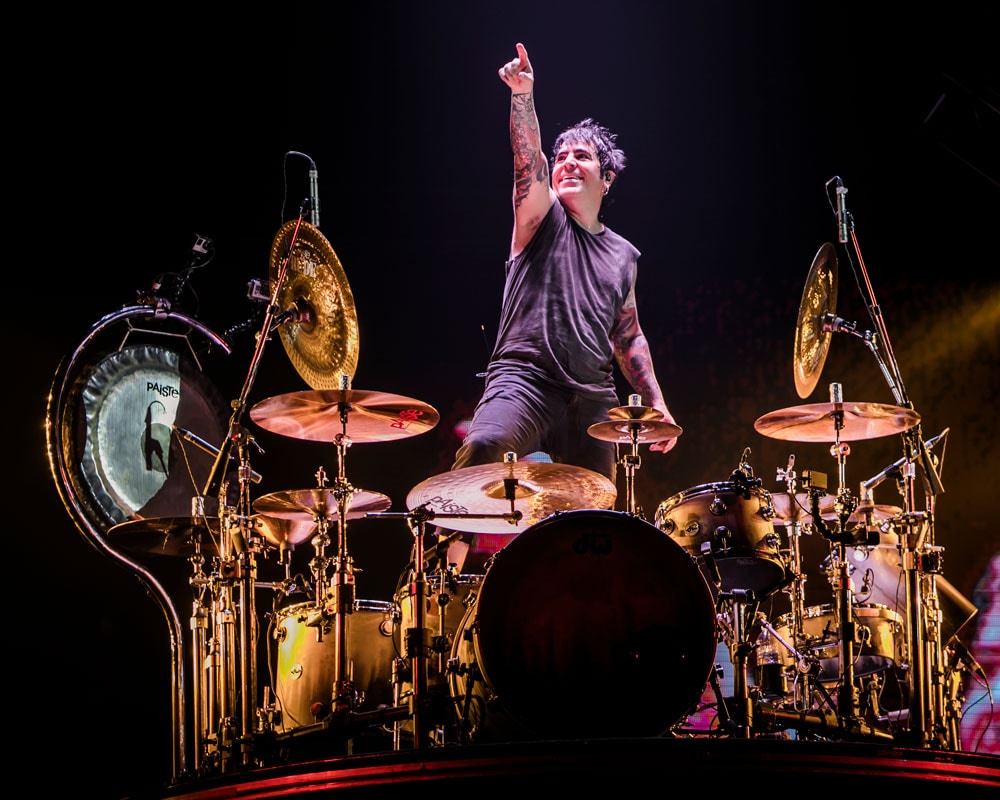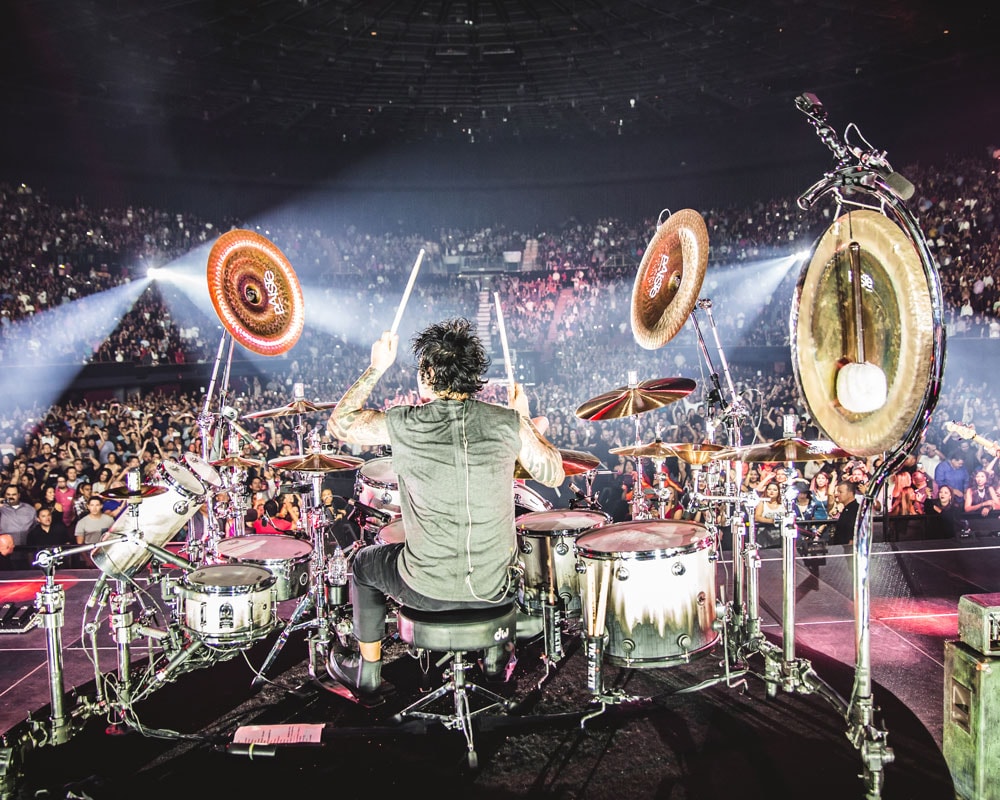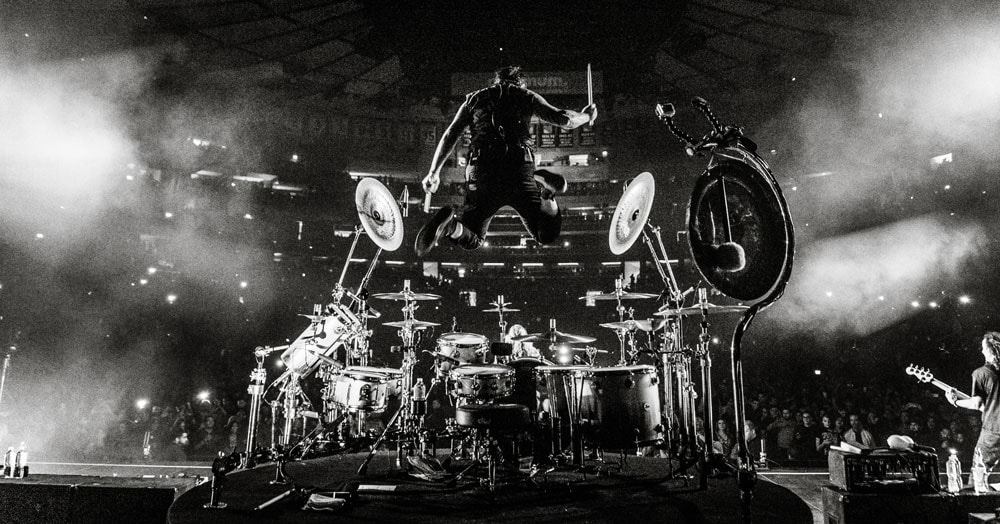The Mexican rock band Maná has blurred genre lines for decades and found huge worldwide success. Drummer Alex "El Animal" González has been holding down the Latin fusion-influenced rhythms since its inception. Having recently celebrated his 50th birthday, González continues to not only challenge himself artistically, but also physically, pushing his body and his playing to the limit. With Maná's tour kicking off in September, the band has 35 shows in the United States alone. And at over two hours apiece, that type of grueling performance is enough to test the mettle of any drummer. We got a chance to speak to González about what it takes to play these marathon sets and what continues to push his creativity.
Can you talk about the evolution of Maná and the evolution of your drumming within the band?
Alex González: I grew up going to Guitar Center in Hollywood and have so many great memories there. Maná has a long, long story. When we were starting as a band, our intention was to make a fusion of pop rock with Latin music and with music from the Caribbean. It sounds easy to say, but it was difficult to do. The challenge was to try to write great songs but have these elements added to our music. So that, in itself, was an evolution. It was something different. We were trying to do something totally separate from other bands at the time. I mean, we didn’t reinvent the wheel. If you look back, Carlos Santana was doing rock and Latin music fusion way before we started. But we just wanted to take it broader and see what else it could do. Rules are made to be broken and that’s the great thing about music. Music is also art, and it’s about exploring and trying new things. So, that was our intention and I think we’ve been able to pull it off. There’s so many bands that have inspired us and influenced us in the rock genre. You know, from The Beatles to The Police, to U2 to more recent bands, like Coldplay or The Killers. There’s just all these amazing bands and artists. But at the same time, we listen to reggae, classical music, salsa and mariachi. We’re always listening to music. That's the cool thing about also growing up in Mexico. You have all this amazing music from the United States and all these bands coming out of England. But at the same time, you had all of this culturally rich music in Mexico. Right now, we’re working on a new project that’s sort of an unplugged/electric album, inviting other artists to do their own interpretation of our songs. And, at the same time, Maná is joining them and putting our spin on what they’re writing. It’s totally different, but we wanted to have fun with our own music. You mentioned our tour this year. It kicks off September 4th in the United States. We have six sold-out shows at the Forum. It’s pretty crazy that we’re doing this huge tour, 35 concerts in the United States, without a new album.
For you personally, are there certain drummers that you're influenced by?
I started playing drums when I was five. I took no formal classes or lessons. I just had a neighbor that lived close by when I was living in Miami that taught me the basic rock beats. He gave me a week of drum lessons. After that, I was able to learn on my own by playing to records. When I started playing drums, the guy that really made me want to become a drummer was Ringo Starr. He was the main guy for so many drummers. Then came Peter Criss and Kiss. Kiss Alive! was a huge impact for me. Then I got turned on to Led Zeppelin and John Bonham. Keith Moon from The Who. He was the first drummer that I ever saw that was standing out more than the lead singer or the guitar player. Stewart Copeland was a huge, huge impact and influence on my drumming and musically in my career. Neil Peart was another big influence. Phil Collins with Genesis. Then Terry Bozzio with Missing Persons. And then you have other drummers coming out that are doing amazing things, like Manu Katché with Peter Gabriel. Alex Van Halen was another huge influence in the hard rock scene from the '70s. All of these guys had their stamp on my musical soul. And I wanted to have certain elements of these guys and try to turn it into my own. Then I started listening to a lot of different music; different Latino beats and Caribbean beats. With YouTube and Instagram, now you have this ability to see all of these amazing videos and classes with all these world-class drummers. I didn’t have that. I’m 50 years old, so I grew up just listening to records and cassettes. Then VHS tapes came along and you were able to see videos of your favorite drummers or other drummers giving lessons. It’s incredible times for the new generation of drummers.
You have access to drummers that you might not have ever seen or heard of. Now they're all at your fingertips in an instant.
Correct. And another thing that I think is very important to mention is, even though I didn’t take lessons, if I would have had the opportunity to have a teacher or to go to a school like Musicians Institute, for example, I would have. I tell kids that are learning how to play drums to take advantage of that. I was very lucky, but I think more education is knowledge, and knowledge is power. You have to have both sides of the coin. You need natural talent with the good ear as well as a great teacher to teach you skills and technique. The more you know, I think the better it is for you.
You had your 50th birthday this year— any celebration plans?
Yeah. I’m going to be celebrating big time with this tour. It’s been an amazing ride and hopefully I can continue to do what I love. A couple of years ago, I had the opportunity to meet The Rolling Stones and hang out with them while they were rehearsing there in Los Angeles. And, to hang out with Charlie Watts and hear how he still plays with that energy at his age—I think he’s such a huge inspiration for so many drummers. It’s not about age, it’s about the passion to continue to do what you love no matter what style of music you play.
 Photo by Chris Costoso
Photo by Chris Costoso
Do you have a warm-up routine or certain pre-show stretches? Over time, have you had to change your approach to playing drums, especially playing really long shows?
Well, with Maná, every time we’re going to go on a tour, I try to practice months and months and months before the tour, and get into shape; more than anything, doing cardio. Running on the treadmill, walking on the treadmill. Doing spinning, even pilates. Anything that can have your body in shape to play, especially if you’re a physical drummer like I am. For example, all the way from now until we start the tour, I’m going to be practicing by myself and rehearsing with the band. People want to see you at your best and they’re paying for a ticket. So, it's your responsibility as a musician to give them the best show and best performance possible. You don’t want to let your fans down or your new fans that are going to go see you for the first time. I’ve had the opportunity to figure out how to be a physical player and hit the drums hard, but get the attack and get the sound that I want without harming either my arms, my wrists or my fingers, and without harming the cymbals or the drums. I have a great friend, and he’s an amazing drummer. His name is David Elitch. Besides being an amazing drummer and an awesome dude, he’s an awesome teacher. He’s given me tips, especially how to get more from the way I manipulate my stick, and letting the stick work more physically than my arm, my wrists or my hands. Growing up, I always read in Modern Drummer magazine—which is like the Holy Grail for all of us drummers—advice for how to warm up and how to take care of yourself before and after going on stage and stuff. So, I always stretch my fingers, hands, arms and legs. I also always warm up at least half an hour before I go on stage. I try not to overdo it so I'm not already tired. I’m going to be working on my solo, because that’s something that I’ve really enjoyed throughout my career with Maná. I’m very grateful that the band has always given me that little moment. I have a chance to interact with my drum set and with the audience— to make a very nice and intimate moment between the audience and myself, and share a little bit of what I know how to do. I think it’s fun. I still believe in solos. I think solos are a great way of not showing off, but showing your musicality or your ability to do things. I love seeing musicianship. And I just love seeing people that know how to play an instrument and seeing them enjoy playing their instrument.
How has your evolved kit over the years? Have you added to it? Have you taken away? Do you like to experiment with your sizes, anything like that?
Well, I’ve basically been very loyal since the beginning of my configuration. If you go to my Instagram, you’ll be able to see all my kits since I was five years old until the present. And it was always a basic rock kit: one kick, snare, one rack tom and one floor tom. But with Maná, I started using two rack toms and two floor toms. And then I added a timbale and an extra auxiliary snare. Then I threw in a couple of rata toms. It all depends on the tour. It all depends on the album. Basically, my kit has been one 12" rack tom, 14" and 18" floor toms, and a 24x16" or 24x18" kick drum. I’ve been using a 5.5x14" aluminum snare. In the past, I used 3.5x14" piccolo snares, which is something that I definitely want to bring back in the near future. Right now, I’m very excited because I’m putting together a new kit for the tour which I can’t elaborate on right now. I love keeping it a secret. Every time I go on tour, it’s like a surprise for the drummers and fans. “Well, what is Alex going to come up with now?” I wanted to customize my drum kits because of Alex Van Halen. I always said, “If some day I become famous and have the means, I’m going to always customize every single kit for every single album or tour that I go on." I've been doing that since 1992. John Douglas has been painting and customizing drums for so many amazing and famous drummers since the '80s/'90s/2000s. He’s Alex Van Halen’s drum tech and Joey Kramer from Aerosmith’s drum tech. He’s done all of Frank Beard’s drums from ZZ Top. The stuff he’s done is amazing. We’re putting together a new kit for this tour.
 Photo by Chris Costoso
Photo by Chris Costoso
You play DW Drums. What other endorsements do you have, and can you talk about your history with those companies?
As far as cymbals go, I’ve been playing Paiste cymbals all my life. They’re such an amazing company. I've been with them since 1983. The same thing with DW. I love the guys at DW, down there in Oxnard. They gave me a family. I was going from drum company to drum company, and then in 2001, I was able to speak with them. They understood what I was doing with rock en español. They believed in what I was doing, so I became part of their roster, and I’ve been with them ever since. For heads, I’ve been playing Remo all my life. I have a really special story with Remo Belli. Remo Belli was like a godfather because he gave me my first endorsement with Remo drum heads and Remo drums. I was one of the first Latin rock drummers to have an endorsement from a major drum and head company. And Remo took me under his wing and gave me so much advice. As far as always making sure that I was getting the right direction as a person, regarding not getting involved in drugs, not getting involved being an alcoholic or being financially responsible, Remo Belli was always like looking after me. And I will always be grateful for that and for his advice. I’ve been playing Vic Firth sticks since 1991. The guy that really got me my signature stick, and got me really, really involved in the whole Vic Firth situation, was Marco Soccoli. He was in charge of Vic Firth artist relations at the time. I’ve been using Shure microphones live always. They're an amazing company. I’ve done different in-ear companies, but I’ve been using CTM monitors since 2013. I highly recommend them. They’re great in-ears, not only for drummers, but also in general. Latin Percussion has also been a great company that I’ve been with forever. In the studio, we use a lot of Latin Percussion instruments, congas, bongos, cowbells, different shakers and stuff, but live I’ve always used their cowbells and their tambourines—the Rock Ridge Rider cowbell and the Cyclops tambourine.
Do you have any other projects you're working on besides Maná?
Yeah. It's a heavy metal/hard rock band called De La Tierra which means “from the land.” And this band is formed with three other musicians from Latin America. One is Andreas Kisser from Sepultura on guitar; Andrés Giménez from a band called A.N.I.M.A.L. from Argentina, and Harold Hopkins, a bass player from another metal band from Puerto Rico called Puya. We have two records out. Our last record was produced by Ross Robinson, the renowned producer—Slipknot, Korn and The Cure. The cool thing about having this other side project is that I definitely had to prepare myself, especially playing things that I don’t play in Maná. I had to work on my double kick speed and my stamina, and also how to hit the drums even harder, but without becoming fatigued or overdoing myself. For that, I had to take certain approaches for things. But it’s still played with the same passion and intention that I do with Maná. To me, it’s all about playing with passion and energy. As a drummer, our goal is to give the song the beat that it requires. We are the backbone. We are the foundation of a song. I’ve always had an open ear to hear what the composer, in this case with Maná or De La Tierra, is bringing to the table and what the song means. There are moments where less is more. Then there are moments where more is more. You have to have that ear and that maturity to understand when to give more and when to give less.
Check out Mana's latest album Cama Incendiada on Spotify:




